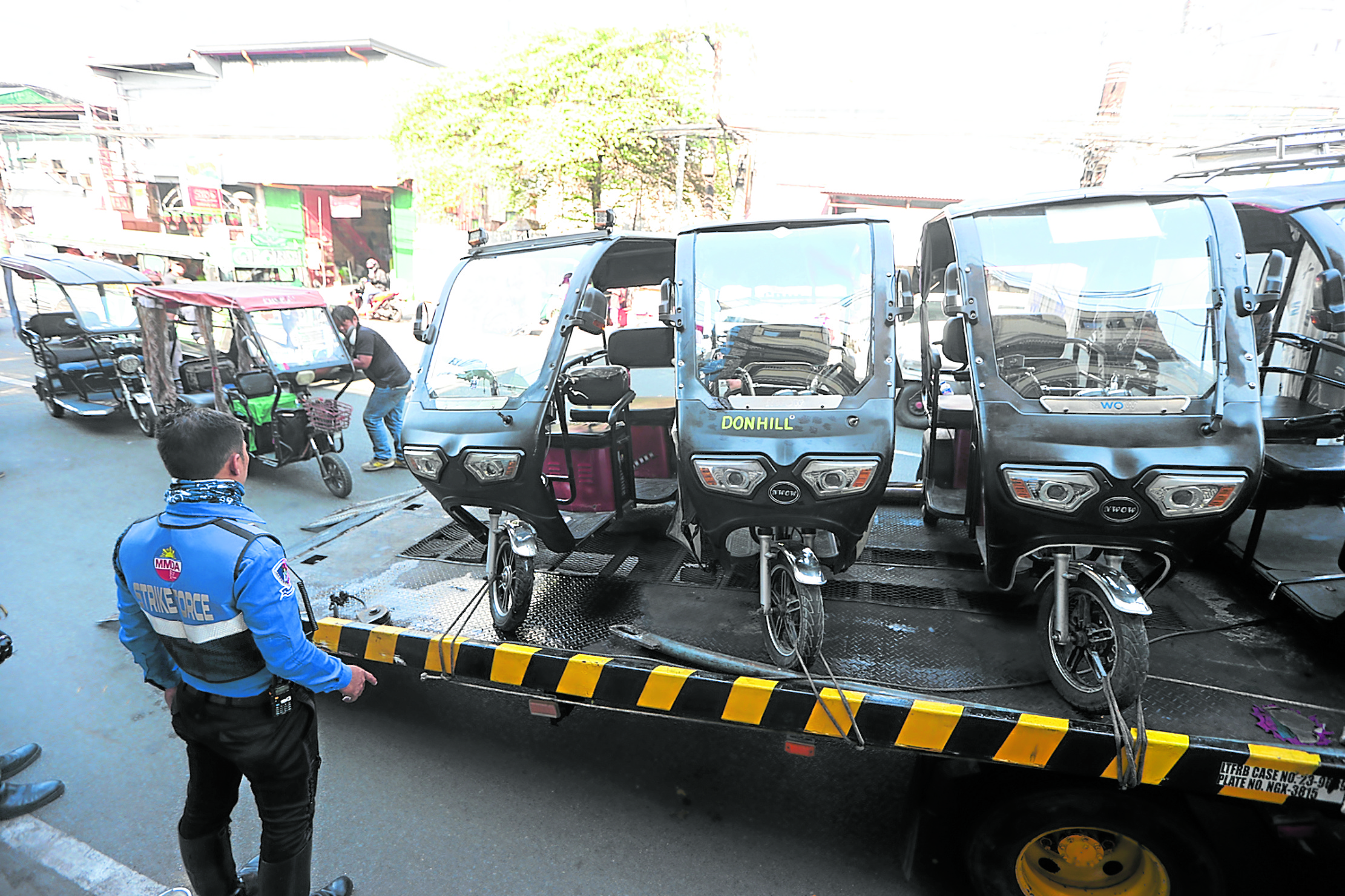
ONE-MONTH GRACE PERIOD A Metropolitan Manila Development Authority enforcer supervises the loading of impounded e-vehicles on a tow truck after these were apprehended on Thursday on Quirino Avenue in Parañaque City. This was before President Ferdinand Marcos Jr. ordered a one-month halt to the meting out of penalties against violators of the e-vehicle ban on major Metro roads to give way to an information drive. —NIÑO JESUS ORBETA
In compliance with President Ferdinand Marcos Jr.’s directive, the Metropolitan Manila Development Authority (MMDA) on Friday said it will use the one-month grace period to inform the public on the banning of e-bikes, e-trikes, tricycles, pedicabs, push carts and kuligligs (motorized pedicabs) from traversing national roads in Metro Manila.
In a press conference in Pasig City, MMDA Acting Chair Romando Artes said the agency received the President’s directive on Thursday morning to partially suspend the implementation of the MMDA Regulation 24-002, series of 2024, which the Metro Manila Council approved in February this year.
READ: Marcos orders MMDA: Grace period before e-trike ban
“Our President is a compassionate leader, and he is sensitive to the sentiments of the public, as some of the violators claimed that they were not aware of the regulation, do not know the alternative routes, and have not yet adjusted their routine in the use of their electric bikes,” Artes said.
The MMDA chief said the agency will study how to go about the cancellation of citation tickets issued to 290 violators and the return of 69 impounded vehicles from April 17 until the suspension of the issuance of tickets on Thursday morning.
“We’re studying if we can make the directive of the President retroactive. We just need to study the mechanics because we have already issued the tickets here and there’s a process in the releasing of the impounded vehicles,” Artes added.
The MMDA chief said if drivers were also apprehended for violating other local traffic ordinances, they might still be subject to the corresponding penalties.
Information drive
During the grace period, Artes said MMDA enforcers will continue flagging down violators of the ban but will not issue tickets and the vehicles will not be impounded. Instead, the violators will be informed of the regulation and advised about alternate roads they can use.
“We will strengthen the widest dissemination of information through the media, social media platforms and all other mediums of the local government units,” Artes said.
READ: Marcos to MMDA: Lift penalties for e-vehicles
He added the consultations and conferences have been conducted while announcements and advisories have been issued to the public prior to enforcement of the ban.
He stressed the MMDA and Metro Manila local governments will focus on informing the public on the alternative routes that users of the vehicles covered by the regulation can traverse.
“We will meet with the ]ocal government’s traffic officials for the identification of alternate routes in Metro Manila,” Artes said.
Before the grace period ends, Artes said the MMDA will also submit a report and make necessary recommendations to the President.
‘Not antipoor’
According to Artes, the P2,500 penalty for violators will also remain once they resume the issuance of tickets on May 18, explaining that such a penalty is really “punitive” because repetitive violations of the law happen due to minimum amount of penalty.
The MMDA chair, who is a lawyer, also brushed off criticisms the strict implementation of the regulation was inhumane and antipoor.
“The law is strict, harsh, but if that’s the law, it must be obeyed. We can’t please everyone. Many complain to us about the traffic. If we make any regulation [on traffic], we will strictly enforce them, without selectivity. If we always use the antipoor card, nothing will happen to us,” he said.
He said MMDA enforcers are sensitive to the situation of the violators. He recounted a case when one driver was apprehended while carrying a recuperating family member from a hospital. He said the enforcers themselves brought the patient home.
Artes warned those who insist on traversing national roads despite repeated warnings by the MMDA enforcers could still be charged with other offenses such as disobeying persons in authority, driving without license and disregarding traffic signs.